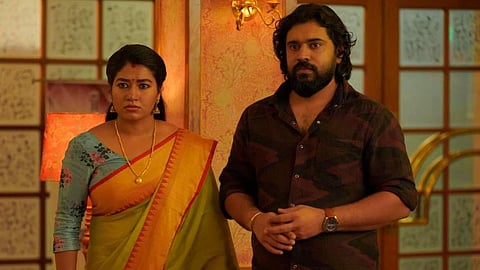Kanakam Kaamini Kalaham Movie Review: Nivin Pauly and gang excel in this deftly-staged comic caper
Rating:(4 / 5)
A hotel in Kanakam Kaamini Kalaham (KaKaaKa), with some warm, inviting, and colour coordinated interiors, becomes complicit in several absurd shenanigans perpetrated by its principal characters. It seems to make people do crazy things, but not to the extent of going on a murderous rampage like Jack Nicholson in The Shining (look for visual references to this one). No, don't worry. KaKaaKa is not a supernatural thriller. But when the characters' inner venom comes out, the result is, to quote Vadivelu, "Total damage!"
First, there was Doctor (Tamil), then Thinkalazhcha Nishchayam (Malayalam), and now KaKaaKa (Malayalam again). I mention these three titles together because they provided for me a much-welcome respite from the endless succession of grim thrillers from Malayalam cinema lately. Just like the first two, KaKaaKa proves itself to be a soothing balm for those reeling from the after-effects of pandemic-induced anxiety. And anyone who appreciated Ratheesh's delectable brand of dark humour in his debut feature, Android Kunjappan, might find themselves with a wide grin by the time the end credits roll. I was sporting one throughout. KaKaaKa exudes the vibe of a PG Wodehouse novel combined with an eye-popping production design that recalls Wes Anderson's films.
Director: Ratheesh Balakrishnan Poduval
Cast: Nivin Pauly, Grace Antony, Vinay Forrt, Vincy Aloshious
Streaming on: Disney+ Hotstar
Right from its first frames, one can see that so much love has gone into each department. The film is all about warm, immaculate presentation. To begin with, the conventional "thanksgiving" approach in the opening credits gets ditched in favour of something refreshingly unique. A self-deprecatory tone is established here and then maintained for the remainder of the film. You see actors not only taking a dig at themselves but also each other. Nivin Pauly is at its most restrained, playing an acting coach with a fondness for method acting. But he's got only... two students. One glance at his character's behaviour, and you would think the man wants to convince everyone he is the descendant of the legendary Lee Strasberg. His attitude is at times evocative of "B.Com First Class" Mohanlal in Nadodikkattu. He is married to an ex-serial actress (Grace Anthony) who, just like her husband, seems to be bothered by insecurities of her own. She thinks he looks down on the very fact that she used to be an "ex-serial actress". When the film opens, we see them through the eyes of a relative of theirs, played by the ever-reliable Sudheesh. He is a mediator, shifting his attention — along with ours — between husband and wife, trying to patch things up between them, but eventually finding himself in a soup.
KaKaaKa makes you assume that it's about something and, then halfway into it, makes you realise that it's about something else. Though much of the events are limited to a hotel, the deft, humorous interplay between the characters is so immersive to make one forget that the whole thing takes place in one location. It's essentially a social commentary disguised as a minor robbery tale. We meet an assortment of eccentric characters, each with amusing peculiarities and the most suitable actor cast in each role. Ratheesh uses them to make a social commentary on the complications arising out of tricky man-woman/man-man-dynamics, the danger posed by certain words, the inappropriate timing of their usage, and the various "experts" with their infinite opinions (especially on social media). The hotel then becomes, in essence, a visual analogy of a Clubhouse room with high BP.
As in Android Kunjappan, the film is a splendid showcase for body language-based humour executed through meticulous blocking. It's not often that we get to see such effective reaction shots that, in some instances, are not necessarily trying to induce sudden bursts of laughter but keep things from getting too serious.
There are, however, multiple instances of laugh-out-loud humour and what's impressive about these moments is that the characters often accomplish by not indulging in any over-the-top shenanigans. Take, for example, a scene where a conversation between an author and another character becomes an annoying hindrance for another character who is simply trying to reach the top floor. Or another hilarious situation where a marriage counsellor struggles to come up with a proper reaction to a tense situation despite claiming to be an expert in 'emotions'. It reminded me of that joke about Will Smith's character in Hitch being unable to solve his relationship problems despite being a relationship expert himself. Or, what about the strange phenomenon where one character says something, and you would see another character, who has not interacted with the former, utter the same line in a different instance. There is some odd telepathic spell at play here.
Unlike Android Kunjappan's slightly dark finale, KaKaaKa ends with a comical high — the end credits sequence left me in splits! What a fabulous way to end a film! Stephen Fry once described his experience of reading PG Wodehouse thus: "You don't analyse such sunlit perfection. You bask in its warmth and splendour." One must savour KaKaaKa in the same way.

